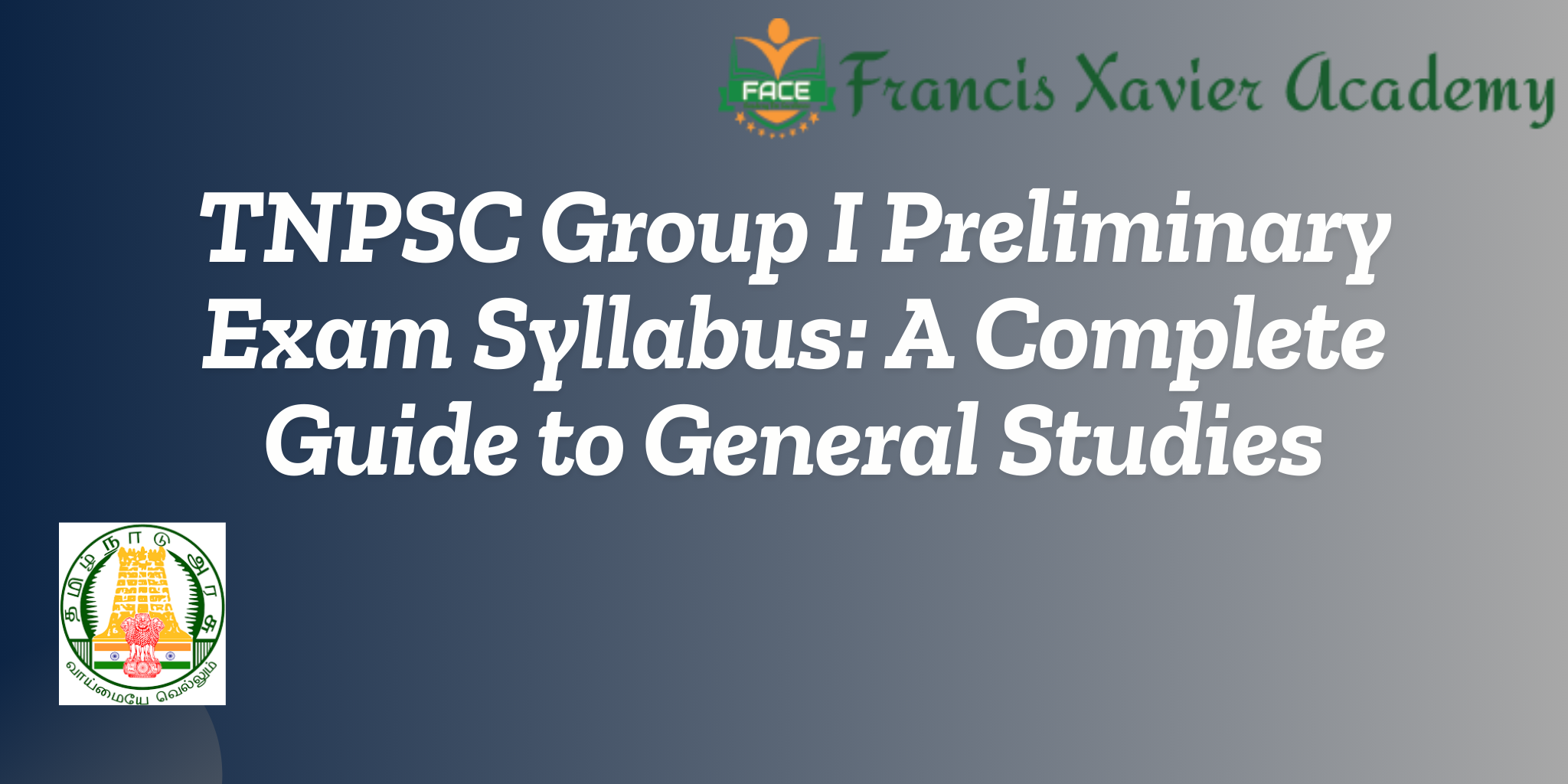
The Tamil Nadu Public Service Commission (TNPSC) Combined Civil Services Examination – I (Group – I Services) is one of the most prestigious exams for aspiring candidates seeking top government positions in Tamil Nadu. Therefore, it is essential for candidates to have clear understanding of the syllabus. The TNPSC Group-1 prelims syllabus: complete guide to general studies provides in-depth look at the topics covered in the preliminary examination. The exam consists of General Studies (Degree Standard), which evaluates a candidate’s knowledge across a wide range of subjects. This blog provides a comprehensive breakdown of the General Studies syllabus to help candidates prepare effectively. Moreover, the exam tests various subjects, making it crucial for candidates to focus on all aspects of the syllabus.
TNPSC Group I Preliminary Exam Syllabus
The syllabus is divided into ten major units, covering subjects like General Science, History, Geography, Polity, Economy, Tamil Nadu’s development, and Aptitude. In addition, each unit plays a crucial role in evaluating a candidate’s overall knowledge and understanding. Furthermore, the subjects are designed to test both the breadth and depth of knowledge required for the exam. As a result, candidates must approach their preparation in a structured manner to cover all these areas comprehensively.
General Science
- Scientific knowledge, reasoning, and conceptual learning.
- Mechanics, properties of matter, force, motion, and energy.
- Basic principles of Electricity, Magnetism, Light, Sound, Heat, Nuclear Physics, Laser, Electronics, and Communication.
- Chemistry: Elements, compounds, acids, bases, salts, petroleum products, fertilizers, and pesticides.
- Life Science: Classification of living organisms, evolution, genetics, human physiology, nutrition, and health.
- Environment and Ecology.
Current Events
- Latest national and international events, historical updates, and eminent personalities in news.
- Political parties, public administration, and government welfare schemes.
- Geographical landmarks and socio-economic issues.
- Latest developments in Science and Technology.
- Key personalities in Arts, Science, Literature, and Philosophy.
Geography of India
- Location, physical features, monsoon, climate, and natural resources.
- Major rivers in India, soil types, minerals, forests, and wildlife.
- Agricultural patterns and impact of climate change.
- Transport and communication networks.
- Population density, distribution, linguistic groups, and major tribes.
- Natural disasters, disaster management, environmental pollution, and green energy initiatives.
History and Culture of India
- Ancient Civilizations – Indus Valley, Guptas, Delhi Sultanate, Mughals, and Marathas.
- South Indian History – Vijayanagar and Bahmani Kingdoms.
- Cultural heritage, social change, and unity in diversity.
- India as a secular state and principles of social harmony.
Indian Polity
- Constitution of India – Preamble, salient features, union and state government structures.
- Fundamental rights, duties, Directive Principles of State Policy.
- Governance – Parliament, Judiciary, Panchayati Raj, and federalism.
- Elections, Lokpal, Lokayukta, RTI (Right to Information), corruption, and women’s empowerment.
Economy of India
- Nature of the Indian economy, five-year plans, Planning Commission, and NITI Aayog
- Revenue sources – RBI, Fiscal and Monetary Policy, GST, Finance Commission, and state-central resource sharing.
- Industrial growth, employment generation, rural welfare, and social challenges like poverty, health, and education.
Indian National Movement
- Freedom Struggle – Early uprisings, formation of the Indian National Congress.
- Prominent leaders like Mahatma Gandhi, Subash Chandra Bose, Bhagat Singh, Jawaharlal Nehru, B.R. Ambedkar, and Periyar.
- Role of Satyagraha, militant movements, communalism, and partition.
Tamil Nadu: History, Culture & Socio-Political Movements
- Sangam Literature, archaeological discoveries, and Tamil Nadu’s cultural heritage.
- Thirukkural and its relevance in social, economic, and political aspects.
- Tamil Nadu’s role in India’s freedom struggle, including early revolts and contributions of women.
- Justice Party, Self-Respect Movement, Dravidian Movement, and leaders like Periyar and C.N. Annadurai.
Development Administration in Tamil Nadu
- Human development indicators and social reform movements.
- Welfare schemes, economic trends, and social justice policies.
- Education, healthcare, and e-governance initiatives in Tamil Nadu.
Aptitude & Mental Ability
- Basic numerical skills – Simplification, percentages, HCF, LCM.
- Ratio & proportion, simple and compound interest, area, volume, time & work.
- Logical reasoning, puzzles, dice, visual and alphanumeric reasoning, and number series.
How to Prepare for TNPSC Group I Prelims?
- Understand the Syllabus – Cover each topic with proper study materials.
- Read Newspapers Daily – Stay updated with current affairs.
- Follow Standard Books – NCERT books for history, polity, and economy.
- Practice Aptitude & Reasoning – Solve previous years’ question papers.
- Revise Regularly – Use mind maps and short notes for last-minute revision.
Conclusion
The TNPSC Group I Prelims Syllabus: Complete Guide to General Studies covers multiple subjects, including history, polity, economy, science, and Tamil Nadu’s development. A structured study plan, regular practice, and staying updated with current affairs will help candidates succeed in this competitive exam. Additionally, focusing on time management and revision techniques will enhance your preparation. Moreover, consistent effort and dedication are key to mastering the syllabus. So, Are you preparing for TNPSC Group I? Let us know in the comments how your preparation is going!
 Now
Now